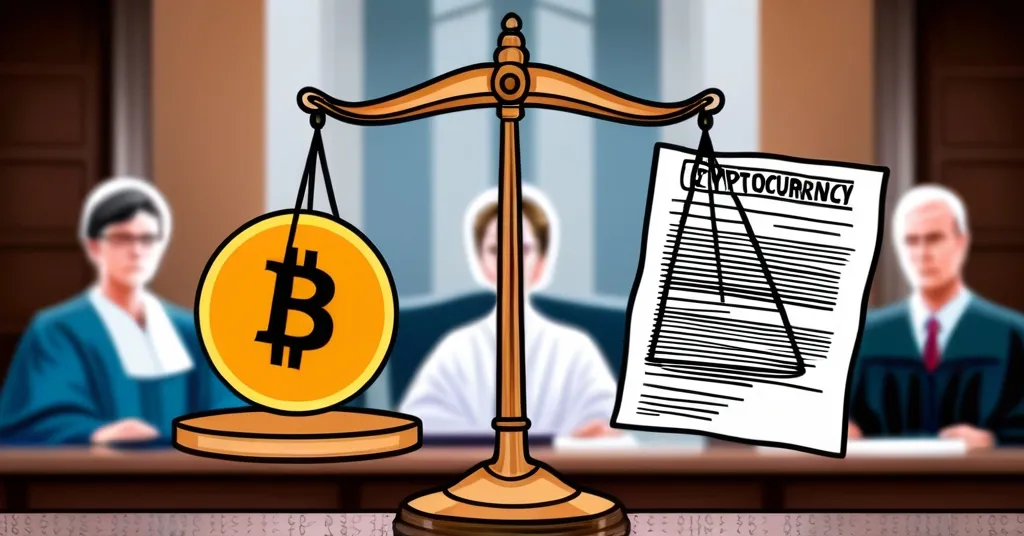U.S. Court Grants Coinbase Rare Appeal in SEC Case: Howey Test in Focus

U.S. Court Grants Coinbase Rare Appeal in SEC Case
Coinbase, the largest cryptocurrency exchange in the United States, has been granted a rare interlocutory appeal by Judge Katherine Polk Failla of the Southern District of New York. This significant move allows Coinbase to challenge the Securities and Exchange Commission’s (SEC) allegations that it operated as an unregistered exchange, broker-dealer, and sold unregistered securities through its staking program. The appeal centers on whether digital assets traded on Coinbase qualify as investment contracts under the Howey test, a question that could reshape cryptocurrency regulation in the U.S.
- Coinbase granted interlocutory appeal
- SEC alleges unregistered operations and securities sales
- Appeal focuses on Howey test application
- Potential to impact future cryptocurrency regulation
The SEC’s lawsuit, filed on June 6, 2023, targeted Coinbase for facilitating transactions in 13 specific crypto assets, including tokens from the Solana, Cardano, Polygon, and Ethereum blockchains. The SEC argued these transactions were unregistered investment contracts. In response, Coinbase filed a motion for judgment on the pleadings on August 4, 2023, seeking to dismiss the SEC’s claims. While the court partially denied Coinbase’s motion, it ruled in Coinbase’s favor regarding its Wallet application, stating it did not act as an unregistered broker by making it available to customers.
On March 27, 2024, Judge Failla granted Coinbase’s interlocutory appeal, allowing it to challenge the case before the Second Circuit Court of Appeals. The appeal’s focus is the application of the Howey test, a legal standard determining what constitutes a security. This test checks for an investment of money in a common enterprise with an expectation of profits from others’ efforts. The court’s adoption of the “ecosystem” approach to the Howey test emphasizes the economic reality of transactions in classifying them.
Fox Business reporter Eleanor Terrett described the appeal as a “big win” for Coinbase due to its rarity.
“The appeal’s rarity makes it a ‘big win’ in the legal battle,” Terrett stated.
Coinbase’s Chief Legal Officer Paul Grewal echoed this sentiment, expressing appreciation for the court’s consideration and readiness to proceed to the Second Circuit.
The outcome of this appeal could have far-reaching implications for the cryptocurrency industry. A favorable ruling for Coinbase might set a precedent affecting other cases, like the ongoing Ripple lawsuit, where a court ruled that XRP transactions on secondary markets were not securities. The court’s decision not to distinguish between primary and secondary market transactions suggests that the Howey test may apply to both, potentially broadening securities laws’ scope in the crypto space.
The broader regulatory context is crucial. The SEC’s actions against Coinbase fit into a pattern of regulatory scrutiny on cryptocurrency exchanges in the U.S. Critics argue the SEC is “regulating by enforcement,” sparking debates about applying securities laws to digital assets. With SEC Chair Gary Gensler set to leave office on January 20, 2025, to be replaced by Paul Atkins, a former SEC commissioner and crypto advocate, the regulatory environment might shift toward more crypto-friendly policies.
This case highlights the tension between cryptocurrencies’ innovative potential and the need for regulatory clarity. As the crypto industry challenges traditional financial systems, cases like Coinbase’s appeal are pivotal in defining permissible boundaries under existing laws. The outcome could clarify how securities laws apply to cryptocurrencies, shaping future regulatory approaches and influencing how cryptocurrency platforms are treated by regulators and courts.
In the world of Bitcoin and blockchain technology, where decentralization and freedom are championed, this case underscores the ongoing struggle against centralized regulatory overreach. While Bitcoin maximalists might view this as a battle against an outdated financial system, the broader crypto community recognizes the importance of a balanced regulatory framework that fosters innovation while protecting investors. Altcoins and other blockchains, like Ethereum, play critical roles in this ecosystem, offering functionalities that Bitcoin does not serve well.
As we navigate this complex landscape, the future of money and finance is at stake. The optimism surrounding Bitcoin and blockchain technology must be balanced with a realistic understanding of the challenges ahead, including regulatory hurdles and potential risks. Yet, the potential for these technologies to disrupt the status quo and drive effective accelerationism remains a beacon of hope for many in the crypto community.
Key Questions and Takeaways
What is an interlocutory appeal?
An interlocutory appeal is a special type of appeal that allows a party to challenge a specific legal question before the full case is resolved.
What are the SEC’s allegations against Coinbase?
The SEC alleges that Coinbase operated as an unregistered exchange, broker-dealer, and sold unregistered securities through its staking program.
What is the Howey test and why is it relevant to this case?
The Howey test is a legal standard used to determine what counts as a security. It is relevant because the appeal will address whether digital assets traded on Coinbase qualify as investment contracts under this test.
How could the outcome of this appeal impact cryptocurrency regulation in the U.S.?
The ruling could provide much-needed clarity on how securities laws apply to cryptocurrencies, potentially shaping future regulatory approaches and affecting how cryptocurrency platforms are treated by regulators and courts.
Why is this interlocutory appeal considered a ‘big win’ for Coinbase?
It is considered a ‘big win’ due to its rarity and the potential to pause and challenge the SEC’s case before it is fully resolved.



